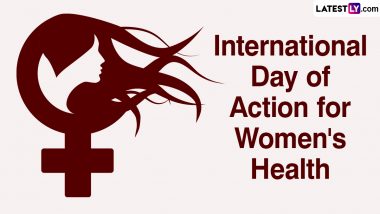We women have the tendency to be more concerned about our loved ones’ health, while being completely ignorant about ours. We have so much on our plate that we do not pay much heed on how are health is deteriorating. We are important, a healthy woman is a happy woman. While we are busy with shaping our careers, taking care of our family, let us take out some time for ourselves and start paying attention to our well-being. If you wait for the right time, you will never find one; the time is now. This International Women’s Day, we help you in adapting a healthy lifestyle. Below are some medical tests every woman should perform in their early 20s, 30s and in 40s.
In your 20s
Annual physical: Although an annual check-up is not necessary, it’s wise to get used to taking charge of your health. Visit your GP for the following check-ups which include blood sugar level tests, cholesterol tests and blood pressure tests. Your doctor will also examine your eyes, ears, lymph nodes. He will also make a note of your age, height and weight and ask about any family medical history.
STD/HIV screenings: It is recommended for all sexually active adults to get annual tests for chlamydia, gonorrhoea, HIV and trichomoniasis which can cause pelvic inflammatory diseases. These tests are performed either by taking a blood sample or swabs from cervix.
Breast self-exam: Breast lumps can be diagnosed by breast self-exam to find early stages of breast cancer. Most lumps in younger women are caused by benign cysts. You can either perform a quick self-breast test or if not confident, you can always go for clinical breast exams. In clinical check-up, tests include are breast exam, mammogram, breast ultrasound, biopsy and breast MRI.
PAP smear: The most often neglected test are the PAP smear test. It is a method performed by scraping of cells from the cervix to detect abnormalities that could lead to cervical cancer. Every woman in their 20s after being sexually active should go for this test once every year. Visit a gynaecologist to get the test done.
In your 30s
Bone Mineral Density Test: The DEXA scan i.e. the bone mineral density test involves a specialised X-ray which screens your spine, hips and wrists. It measures your bone strength and assesses your risk of fracture. Osteoporosis is a common degenerative condition of the bones where vital minerals like calcium leach from the bones making them weak and brittle. This condition affects 80% women and aggravates dramatically after menopause. Although the test is usually recommended to a woman who has achieved menopause but nowadays many women have low bone density and are unaware of it.
Thyroid Test: Indian women above the age of 30 are more prone to Thyroid disorders like hypothyroidism and hyperthyroidism. Indicators of an underlying thyroid disorder are sudden weight gain or loss, fatigue, thinning of hair and brittle nails. Hence, a thyroid function test is one of the most important tests to protect you.
Diabetes Screening: Diabetes damages a lot of your organs if not tested and evaluated at the right time. If you have symptoms of being a diabetic, get yourself tested for sugar in the blood. Many women get diabetes during their pregnancy. Though gestational diabetes goes away in most cases, it raises the risk that you’ll develop type 2 diabetes later in life.
In your 40s
Eye Exam: Eye check-ups are essential once you turn 40 and you should be tested for glaucoma every 1 to 3 years. While developing presbyopia that is trouble reading up close isn’t dangerous and a pair of glasses might suffice, consider this struggle a reminder that you should see an optometrist for a check-up. You should also check for retinal disease especially if you have diabetes.
Blood pressure check: It is recommended to get your blood pressure tested at least every year or two starting at the age 20. Once you enter midlife, it’s furthermore important to stay on top of it. High blood pressure is a major risk factor for heart disease and stroke, which rarely has any symptoms.
Vitamin D test: This is a key nutrient that helps in maintain strong bones and protect you against cancer and infection. As we age, our bodies become less efficient at synthesizing vitamin d from the sun. So, once you turn 40 it’s more likely that you’ll become D-deficient. A simple blood test can check the level of vitamin D in your blood. If the doctor finds any signs of low bone density, he will recommend taking a vitamin D supplement or suggest ways to increase your vitamin D.
Colonoscopy: Ideally performed when you have reached 50 years of age. But people who have a family history of colon cancer should get this test done at 40 itself.
FSH Test & Pelvic Exam: FSH test helps in determining your menopause stage. And pelvic exam should be performed annually which helps in trapping any changes in the vagina, fallopian tubes, bladder, rectum and uterus.
These are few essential tests that one must advocate to every woman. A flourishing physical health will help in a balanced mental well-being. We advise all the woman out there to prioritise their health and get these tests done if you haven’t done it yet. It will help you in assessing the problems, if you have any, and will aid you in finding a solution to it. We wish all the women, Happy International Women’s Day.
(The above story first appeared on LatestLY on Mar 06, 2018 11:25 AM IST. For more news and updates on politics, world, sports, entertainment and lifestyle, log on to our website latestly.com).













 Quickly
Quickly





















